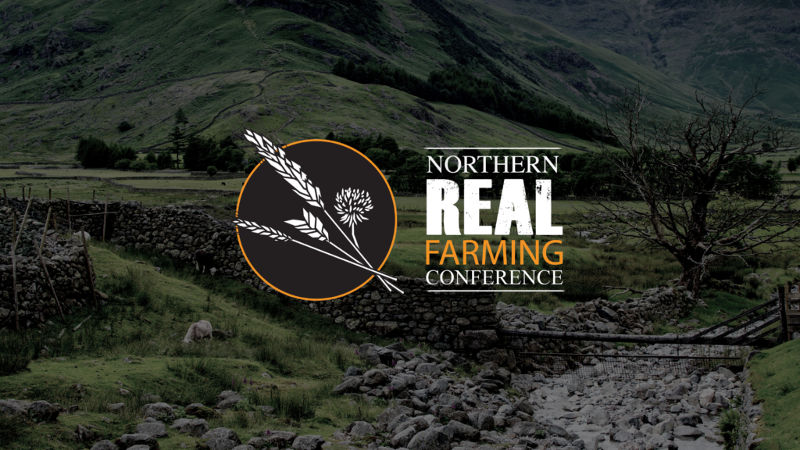The first ever Northern Real Farming Conference opened on Monday 28 September with around 400 registered participants with a stake, or interest, in regenerative farming systems in the North of England and Scotland.
Beginning with a view from Colin Tudge, co-founder of the Oxford Real Farming Conference, we explored the principles of real farming and their context within the current global economic framework. The potential benefits of systems- and place-based approaches were put forward by Anna Clayton as an example of practical ways that we can work together to achieve change. Rod Everett, organic farmer from Roeburndale (north Lancashire), then set out the scale of the challenges ahead from a farmer’s perspective, including a depressing range of statistics outlining the impact of industrial farming on our landscapes and biodiversity. While the challenges are formidable, it soon became clear how determined a collectivity there is, ready to confront them.
Twenty six sessions were programmed for week one, plus a number of social sessions and the week unfolded as a series of ongoing conversations, brimming with enthusiasm and hope.
Even though we cannot do justice to the breadth and range of topics and conversations which took place, we would like to highlight five emerging themes from the first few days.
Firstly, there was a strong emphasis on the importance of creating and being part of farming and food systems that work better – for us as farmers, conservationists, activists, communities, citizens. We heard from farmers who had set up new online shops during Covid-19, about urban opportunities and land ownership options, and about the benefits of community supported agriculture models. We explored seed saving and also looked at the urgency, and difficulties, of producing for local needs rather than commodity markets, and how questions of land ownership in particular are entangled with the viability of creating ‘small farm futures’.
Secondly, right from the opening session, we were reflecting on the question of which voices were not included in the event, and how could we bring them in. A socially just farming and food system requires us to ensure that all voices are heard and we all, collectively, need to do more to ensure that this happens throughout our processes and systems, as well as to enable new entrant farmers from a range of backgrounds.
Thirdly, one ambition of the NRFC was to create space for discussing the challenges and opportunities of the upland landscapes typical of much of Northern England and Scotland. These upland areas have become contested spaces in recent years and we had lively discussions in a number of sessions around creating a shared vision for how farming, biodiversity, ‘public goods’ (such as clean water and air), culture and tourism can co-exist in this landscape. Sessions discussed practical approaches as to how farming and biodiversity can be integrated in upland areas, including habitat restoration on common lands and agroforestry, along with a popular discussion session on upland perspectives. Throughout these sessions a common theme emerged: the need for collaboration and sharing of perspectives and knowledge, both within the farming community and beyond.
Fourthly, how to counter biodiversity loss and its impact were considered by many of the sessions, with a particularly impassioned workshop on the role of dung beetles in building soil and animal health. In this session, virtual tours with three farmers hunting for dung beetles showed how important it is to look more closely at the land we live and work in, and to manage it to support this biodiversity that in turn supports us.
And finally, it is worth reflecting on the importance of community, gratitude and hope. Despite being an online event with limited opportunities for those free flowing, often late night conversations that put the world to rights, (although some people are managing that via zoom!), the importance of the growing movement in the North is key. One session began with an invitation to consider who you can be grateful to, and this is a practice for all of us standing for a different future. The resolve we share shone through many of our interactions this week, including the chance to chat, share perspectives and inspire each other.
Thanks to everyone who is taking part in this first ever Northern Real Farming Conference; from those who have brought their sessions online to everyone taking part in their first online conference experience!
Join us for week two of the first ever Northern Real Farming Conference.
Ticket are still available: https://www.northernrealfarming.org/tickets/
The full programme schedule is here: https://www.northernrealfarming.org/schedule/

